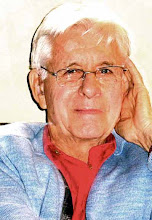Faith in Science.
Blaise Pascal, the famous scientist, who invented the first workable barometer and gave his name to barometric units, kilopascals was also a truth-seeker. He in later years became a philosopher and as such he formulated his famous wager.
Pascal argued that on matters where we don't have certain proof, we have to make an educated guess taking into account the consequences of being wrong.
If we believe in God and it turns out He doesn't exist, the downside risk is very small: metaphysical error. If we reject God and it turns out He does exist, the danger is very great: eternal separation from God.
BLAISE PASCAL'S FAMOUS WAGER
Possibilities:
A. God is or B. God is not.
Choices:
C. I believe or D. I do not believe.
The four possible choices are:
(BD) God is not. - I do not believe in God. Nothing gained, nothing lost. Get on with life don't waste time arguing about nothing.
(BC) God is not. - I believe in God. I have had a good life and build good relationships. Love life while thinking good thoughts.
(AD) God is - I do not believe in God. I fight constant doubt and wish I had proof. I challenge everybody I meet. Infinite separation from God nags me.
(AC) God is - I believe in God. Infinite reward, happiness here on earth and happiness eternally.
On this basis Pascal argued that it is irrational to reject God. "Let us weigh up the gain and loss involved in calling heads that God exists. If you win, you win everything. If you lose, you lose nothing.
Do not hesitate, then: wager that He does exist."
Glenn Shaver
Subscribe to:
Post Comments (Atom)


1 comment:
Mike April 1st, 2008 at 6:06 pm
SENT THIS COMMENT
Love your comment on Pascal’s wager Glenn. That used to haunt me as a doubting Christian and was even used by fellow Christians for a reason to believe! I sometimes have the job of explaining myself that I am not rejecting god but instead denying the existence of such a being. Believing in god or not was not a choice but a bi-product of my reasoning.
Whenever I make a decision my parents always seem to play an important role. Since they are the ones I can trust to be there for me I also trust them with the advise they give me. I am very wary of the various influences in my life though, a self aware soft determinist by nature and I would hate for my reason to be off some pathetic bias. So even with parental advise (among others) I can still come to my own decisions. I found out that my love for A.A.Milne might have come from my mum reading so much of his poetry to me when I was a baby!
Next time I get questioned on the basis of Pascal’s wager I’ll talk about the conclusion you came to. It’s brilliant, great to hear (or read?) from another person who values the power of reason!
Post a Comment